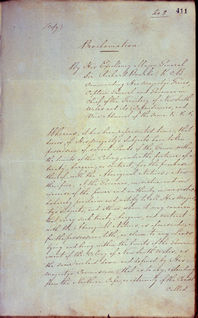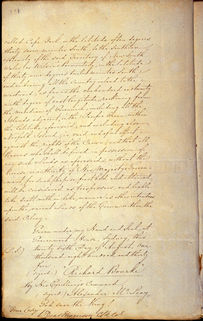

Governor Bourke's Proclamation 1835 (UK)
Significance
This document implemented the concept now known as terra nullius upon which British settlement was based, reinforcing the notion that the land belonged to no one prior the British Crown taking possession of it. Aboriginal people therefore could not sell or assign the land, nor could an individual person acquire it, other than through distribution by the Crown.
History
When John Batman, one of the pioneers in the founding of Victoria, first settled at Port Phillip, he made an attempt to buy the land from the Aboriginal people through a 'treaty'. New South Wales Governor, Sir Richard Bourke, effectively quashed the treaty with this Proclamation issued by the Colonial Office and sent to the Governor with Despatch 99 of 10 October 1835. Its publication in the Colony meant that from then, people found in possession of land without the authority of the government would be considered trespassers.Although many people at the time also recognised that the Aboriginal occupants had rights in the lands (and this was confirmed in a House of Commons report on Aboriginal relations in 1837), the law followed and almost always applied the principles expressed in Bourke's proclamation. This would not change until the Australian High Court's decision in the Mabo Case in 1992.
Description
The document shown is the copy of the Proclamation retained by the Colonial Office; the document despatched to Governor Bourke has not been located. | Long Title: | Proclamation of Governor Bourke, 10 October 1835 |
| No. of pages: | 2 |
| Medium: | Paper |
| Measurements: | Not known |
| Provenance: | Colonial Office of the British Government |
| Features: | A document not available in Australia |
| Location & Copyright: | National Archives of the United Kingdom |
| Reference: | PRO UK: CO 201/247 ff 411 r + v |

